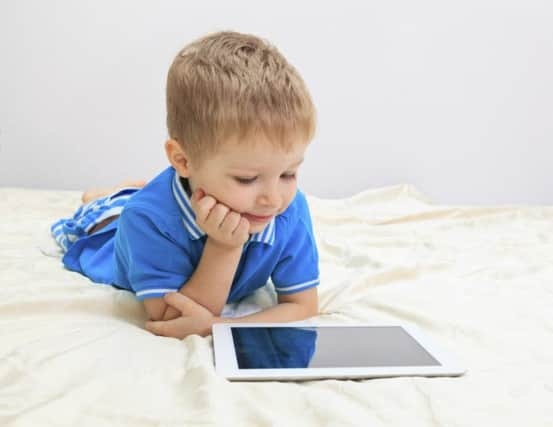Family: technology


But ‘digital immigrant’ parents not really understanding the technology that drives the modern world doesn’t mean their children will use such technology any less. And that means Mum and Dad have a parental duty to be as informed as possible about their kids’ digital lives.
Easy to say, but perhaps not so easy to do - after all, it’s not something your own parents, or even your friends, are likely to be able to provide expert advice on. But child and adolescent psychiatrist Dr Jodi Gold thinks she can - and that’s why she’s written the new book Screen-Smart Parenting.
Advertisement
Hide AdAdvertisement
Hide Ad“As a parent and as a child and adolescent psychiatrist, I wanted to develop a more thoughtful approach to parenting with digital technology,” she says.
“You can run, but you can’t hide from the digital age. It is here to stay, so I wanted to develop a more fearless approach where we embrace it and control it so we are not controlled by it.”
Gold, a mother-of-three, stresses that all decisions about digital issues need to be both age-appropriate and related to what parents already know about their children and their family culture. In other words, parents need to rely as much as possible on their own instincts.
One obvious aid to navigating the minefield that is the internet is parental controls which can help stop children accessing inappropriate web content.
Advertisement
Hide AdAdvertisement
Hide AdHowever, Gold says she doesn’t generally recommend parental controls and filters.
“They do work for some families and they may be necessary if your children are truly misbehaving online, but I believe we should allow our kids to make small mistakes online. They can’t build resilience or learn to navigate the world if we restrict their access.
“If your child ends up on an inappropriate website then use it as a teachable moment.”
She points out that most teenagers and tweens can get around parental controls with one or two clicks, and says that “transparency” is what she would encourage instead.
Advertisement
Hide AdAdvertisement
Hide Ad“I recommend being clear with your kids about which sites are appropriate and forget about the filters and spyware,” she advises.
But Gold isn’t advocating that parents should simply tell their kids which sites they can go on and then leave them to it. She says every family should have rules around technology, and explains: “These guidelines should reflect your family’s culture and values.
“The rules will change as your children grow and as they learn to use technology in a responsible and balanced way.”
However, Gold isn’t a great fan of setting time limits for kids’ use of digital equipment.
Advertisement
Hide AdAdvertisement
Hide Ad“Many parents find time limits helpful,” she admits, “but I tend to de-emphasise them.
“Parents and kids spend a lot of time fighting over 15 minutes of screen time, when the emphasis should be on how they use their devices and less on how much time they spend on them.”
Gold points out that if children use their devices for school, organisation and healthy social connectedness, that’s another reason for not introducing usage time limits.
“There should be safety guidelines in place, and there should also be kindness guidelines in place,” she says.
Advertisement
Hide AdAdvertisement
Hide Ad“Parents should follow their kids online and there should be consequences if kids are being mean or bullying.”
The book explains how different ages of children use digital technology, and outlines the various social media sites and what kids use them for. And Gold stresses that parents should be on social media sites with their kids.
The book also tackles the thorny issue of whether to use technology as a parental tool that can be confiscated if a child misbehaves.
“I think parents threaten and take devices away all the time - they often use devices as a consequence for bad behaviour. At times, it may be effective to take them away, but I think this parenting tool is overused.
Advertisement
Hide AdAdvertisement
Hide Ad“If you take a teenager’s device away, they’ll simply use other devices. There are times when it’s appropriate to take them away, but we really need to focus on teaching kids and teenagers on how to use their devices wisely.”
Aside from safety issues, the digital world is frequently accused of being responsible for children having inadequate social skills, as they often communicate online instead of face-to-face.
However, Gold points out that polls have shown teenagers prefer real-life interaction to electronic communication She says they report that electronic communication is more convenient, but parents should encourage them to spend real time with their friends.
Another question often pondered by ‘digital immigrant’ parents is how long is too long for children to spend using digital devices.
Advertisement
Hide AdAdvertisement
Hide AdThe answer, says Gold, depends on what kids use technology for - if your child is on inappropriate sites or connecting with strangers online, an hour a day may be too much. But if they’re online collaborating on coding, music or art then many hours may be appropriate.
“Digital technology is likely to be detrimental if your child is using it to avoid real-life interactions, or if it’s truly interfering with sleep, school and family life. It’s detrimental if your child feels bad when they’re online.
“But one size doesn’t fit all. As a parent, your job is to help your child use technology to enhance their lives and not harm it.”
Screen-Smart Parenting by Dr Jodi Gold is published by Guilford Press, priced £9.99. Available now.